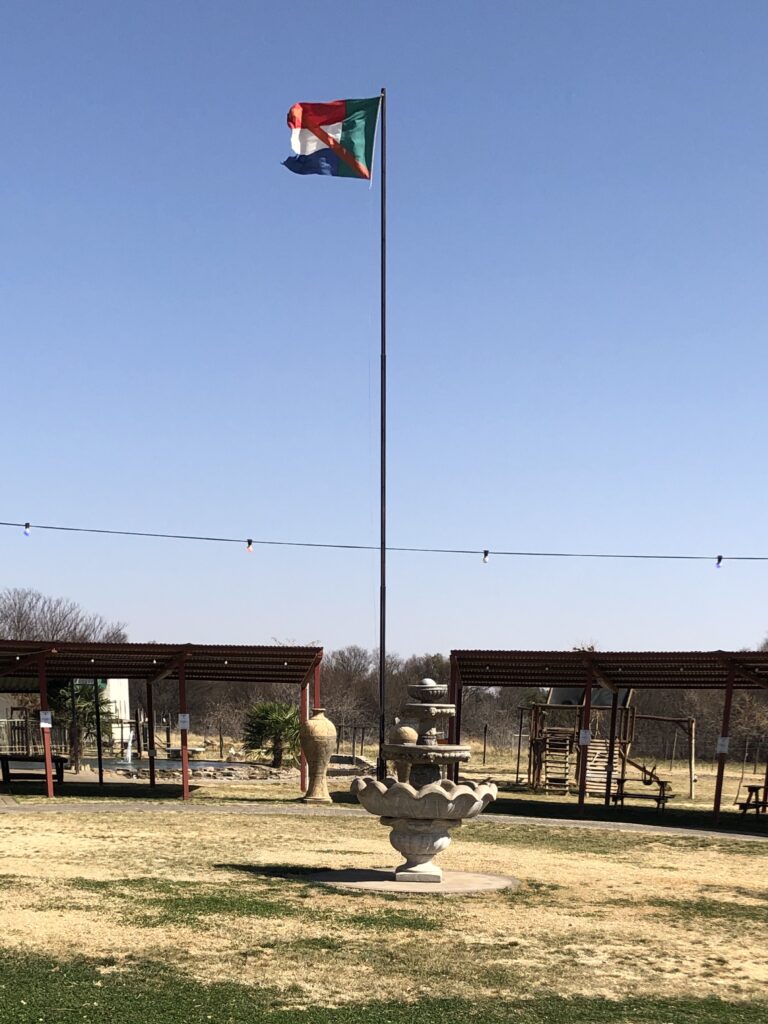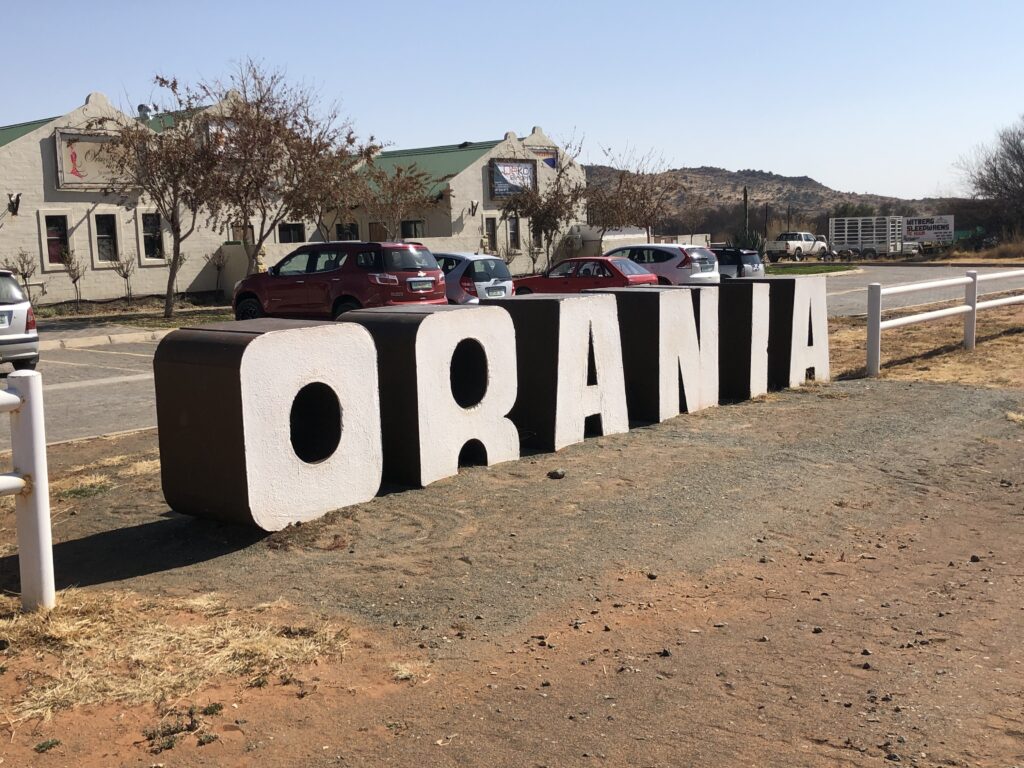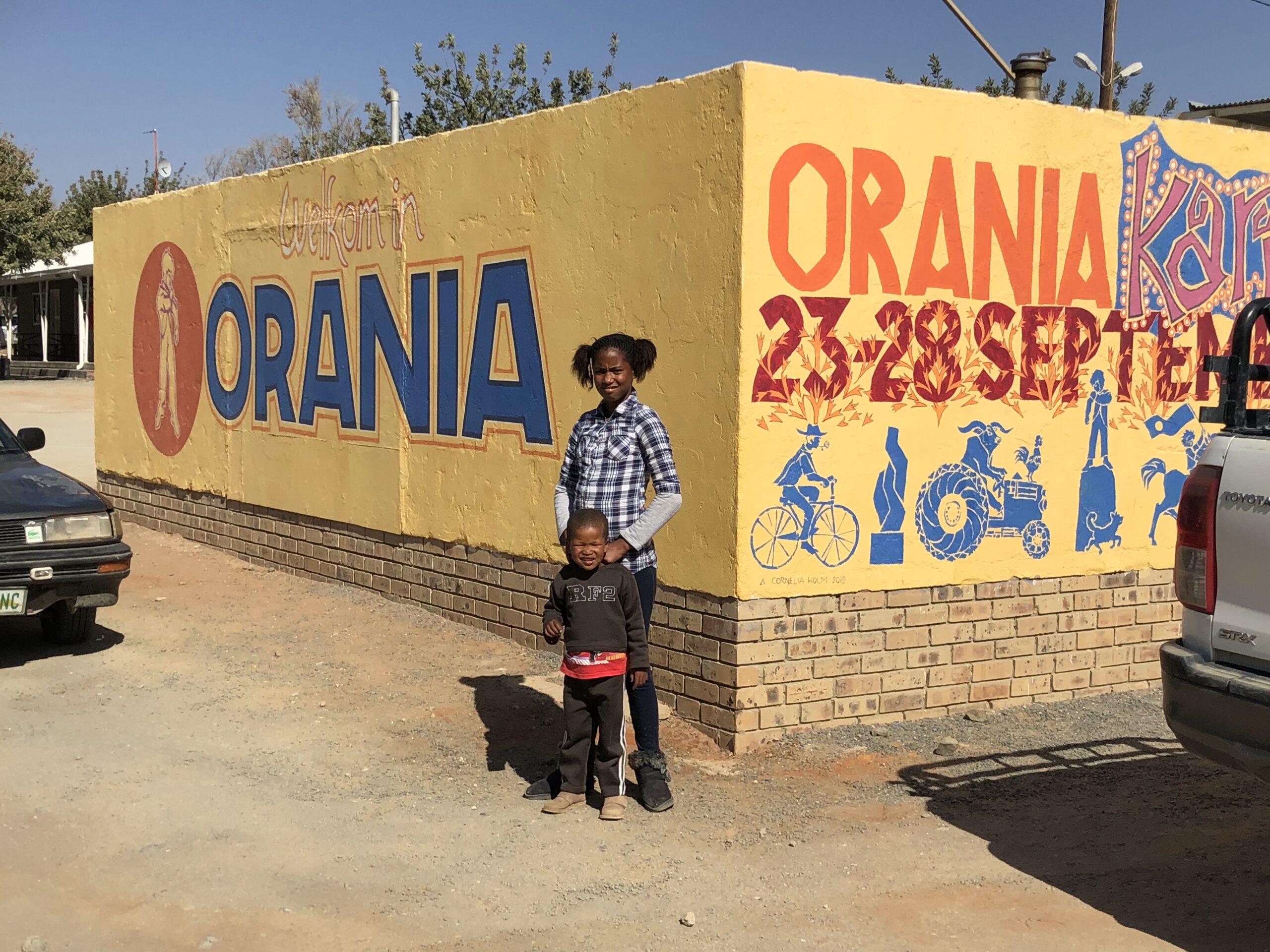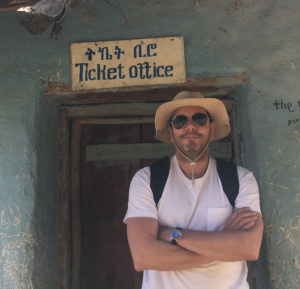The road trip is how travelling used to be.
It wasn’t that long ago that most travelling took place not in giant, silver time-machines that roar from airport to airport, but on wheels that travel infinitely more slowly.
The slowness of the process emphasises the act of travelling to an extreme. One is conscious of almost every metre traversed. The telephone poles bob past. Landscapes shift around our little fuel-driven capsules, as we head for the horizon.
An unusually large tree.
A strangely shaped hill.
A small town named after a minor Victorian explorer.
Another unusually large tree.
The mind whirs at first, but then slows. Tamed by the gentle pace of the journey.
There’s also the absence of crowds. The possibility of solitude. Being stuck in a plane is a group activity — just like attending a football match or going to the cinema — involving hours spent in airports; buildings which seem to be constructed in homage to that cathedral of our civilisation: the shopping mall.
Less so during the road trip, which also allows for pit stops.
Travel without the madding crowds. Without the strangers.
Which may be why the purest road trip is the one taken alone. The number of people involved scaled back to just one.
With only those strangely shaped hills for company.
And that abandoned, roofless farmhouse.
Solitude. Time. No screens. The hypnosis of endless tarmac. All the pre-conditions for thought provided.
“When from our better selves we have too long
Been parted by the hurrying world, and droop
Sick of its business, of its pleasures tired
How gracious, how benign is Solitude.”
Said better by Wordsworth, as is usually the case.
For others, the Corona crisis has been different. But for me it has meant being under house arrest with two other people. People whom I love but, after four months, am very keen to get away from. Away from the sound of the washing machine, the X-Box upstairs, the dog scratching.
I’m on my way to Kimberley. I’ve been to Munich 14 times. But never to Kimberley!
I’m already missing my home/my fiancée/my plum tree.
Then the phone rings. There is a conversation about X-Box usage. My chests tenses.
I’m suddenly missing home a little less and the car surges forward.
Hills. Fields. Farms with barns.
A hardware store next to a church.
Then a dam.
Without a single house built on it.
More hills.
Bored of my podcasts, I turn on the radio. I switch between country music, a cricket match between two teams I have never heard of, and sermons in languages I don’t understand.
Churches.
Yes.
So many churches; built before we retrenched God and began to worship in shopping malls. Sometimes daily.
“Sale. Buy now. 50% off. Easy credit available. Buy one, get one free.”
Welcome to Belvedere. Population 650.
Welcome to Delareyville.
Welcome to Fredericksburg. Home of the world’s second-largest bottle of beer.
The ground underneath the road to Kimberley must be endlessly hollowed out, a continuous labyrinth (very possibly containing Minotaurs) of mineshafts, more tunnel than soil, because there are mines everywhere. One after the other after the other.
The long, round, grey-ish mine dumps rise up out of the scrubby vegetation around them, like whales in an ocean.
I’ve taken the backroads on this leg of the trip, and I realise that backroads often take you on an uglier route than highways. They tend to link small, dying towns one after the other, rather than directly linking one functioning place to another one. I pass a huge rubbish dump smoldering with a dozen half-hearted fires. A fence across a lonely, windy field has caught a thousand plastic bags as they spun along the grass. They are caught on the wire now, dancing like Tibetan prayer flags.
Roofless, windowless, gutted buildings that would be at home in Sarajevo or Somalia during their unpleasant periods.
What is it about a lonely, ruined building, surrounded by grassland, that speaks to something far inside our broken hearts?
But then the country opens up. And there is the blissful nothingness that backroads can yield. Farm after farm after farm. Just very pale winter grass bobbing in the wind. Blonde on blonde on blonde.
The fields are endless. One after the other. Maize. Soy. Maize. Maize. Soy. Irrigated barley. Maize. Some strange scrubby crop with now-brown leaves. More maize.
Some 80s songs I don’t remember adding to this playlist make their presence felt.
Take on me-eeee…
I’ll be gone…
It is Wham! I think. Or maybe A-ha?
For reasons that make no sense at all, it’s perfect.
This is slow travel. This is how travelling was hundreds of years ago (perhaps with fewer George Michael songs though). Also how travelling happened when I was child. No journey under six hours was flown. That was an extravagance. Besides, I was told, it would take so long to get to the airport that it’d be quicker to drive.
The pale blue Peugeot 504 station wagon. I’m not sure leather seats had been invented yet. Or maybe they too, were an extravagance?
I’d play games with the telephone poles as they crept up and then flashed past. Could I get it to line up with the tree behind it on the horizon? No iPads then. Only the lonely beep of the Pacman game. Until the batteries died, or my sisters and I became bored of it.
What colour will the next car be?
“That’s not grey, it’s silver! You’re cheating!”
When we got tired, we would sleep in the endless back section of the 504. No need for seat belts. In the 1970s car accidents didn’t really happen. I think they were only really invented in 1985.
It would have been a more authentically 1970s experience if my father had been smoking while driving. One arm (short-sleeved) out the window holding a Benson & Hedges. But he wasn’t a smoker or a drinker. So not very 70s at all really.
How clearly I suddenly remember the heat inside the car. The sound of the tyres. The intensely territorial battles over which sibling owned which section of the back seat.
My mother talking. The concrete picnic tables, round with a curved bench on either side. Tea in a flask. Sandwiches cut diagonally. One of them dropped in the sand. Coke in a heavy glass bottle.
The tape deck stuck again.
“That’s not grey, it’s silver! You’re cheating.”
Apparently a road can take you places you weren’t expecting – like back in time.
I find a new podcast. The hills and trees fly past. I’m hurtling along from one tiny town to another when I see it.

Orania.
The ACTUAL Orania? I thought it was in the “Orange” Free State and spelt differently. It’s so small that I actually drive through it before I’ve realised what is going on.
Orania. The Afrikaner homeland that was established in the Northern Cape by nationalists based on the principle of “selfwerksaamheid” or “self-reliance”. Initially it was supposed to be the first of several towns in a “Volkstaat” which the founders energetically denied was a volkstaat at all. The theory was that other small towns between Orania and the Atlantic coast such as Preiska, Britstown, Carnarvon, Williston and Calvinia would join the enterprise.
It was formed in 1990, near the fall of apartheid, and lead by Carel Boshoff, (the son-in-law of former South African Prime Minister and engineer-in-chief of apartheid, Hendrik Verwoerd). About 40 Afrikaans families bought the dilapidated town for about R1.5-million and commenced building an Afrikaans Camelot. Or an above-ground Führerbunker with bakkies?
“Knegte van die allerhoogste, teen die hele wereld vry! (Servants of the Almighty, against the whole world, free!)” — states Verse 4 of the original anthem, Die Stem.
Orania was run until recently by Carel Boshoff Jr — Verwoerd’s grandson — until he was forced to resign because of allegations of corruption and the purchase of a Mercedes. How very, very like the politicians he and his brethren claim to be totally un-like…
I stop the car on the side of the road.
Orania.
The town where black people aren’t really allowed. And English-speaking people are frowned upon.
I’m feeling strange feelings. How did I get here by accident? How is this place even allowed? Doesn’t the Constitution say that … It’s getting weird … I have to stop my brain from doing what it is doing …
I park my Mini (yes, I know) next to a phalanx of bakkies at the tasteful row of shops and get out. Part of me is thinking that it would be fantastic to be here with my gay, black friend Larry whom I was texting only a few hours ago. Then I realise that might be a bad idea. Given how even my jeans and Barbour jacket mark me out as exactly the kind of urban smarty pants the founders of Orania abhor, I have a pretty good chance of getting the shit kicked out of me entirely without Larry’s help.
I’m nervous. In my past there have been unpleasant incidents with people like this. I don’t know what they hear when I open my mouth, even when I’m trying to be ingratiating, but they don’t like it.
The shops all have signage exclusively in Afrikaans. The men all have beards. They wear predominantly khaki, and those weird, big, slip-on farmer boots without laces (good for kicking the likes of me). The women are quiet and non-descript. I think they enforce that early on around here.
The shops are all built around a grassed central area, in which there is a flagpole.
Flying from this flagpole, situated behind a strip mall, is the flag of Orania. It looks like a flag from one of the old Boer republics with a diagonal orange stripe running through it.
The fact that the main flag-flying area is here in (I have to say it again) a beige strip mall, opposite a shop selling biltong and baseball caps and another one selling (I think) electrical supplies, truly says something. I’m just not sure what.
Orania has (in addition to its own flag) its own currency — the Ora. According to the internet, there are about R500 000 worth of Ora in circulation. As part of a programme to encourage its use, some shops in Orania offer a 5% discount on purchases made using these notes.
I really want to buy something and ask for my change in Ora. But I don’t. Probably because I came here by accident and am a bit scared.
Given the number of very expensive 4x4s and bakkies, there seem to be a number of obviously very poor, white people. Perhaps this place has a unique attraction for them? Our consumerist society has told them they are of no worth because they are poor, but maybe here they feel they have value because of the colour of their skin?
I walk into a supermarket. I’m back in the 1970s. Nothing seems contemporary. The shelves are a bit empty. The clothes are not quite right. All the staff are white. Nobody at all is wearing a corona mask.
It’s very strange. And a bit North Korean.
I feel self-conscious that I’m almost the only person wearing a mask. So I stop and ask two bearded locals why nobody else is.
“Corona is a city thing,” the taller one says. “We don’t worry about it here,” adds the other one, pulling at his moustache.
It makes no sense. Do they consider the pandemic to be something only corrupt city dwellers like myself can contract? Or is there some belief that their racial purity will protect them? I have no idea.
I’m not quite sure what to say, which somehow puts the pressure on them to say something more.
“It could be a conspiracy,” the taller one says, “a way for governments and the UN to increase their power.”
Okay, so three sentences in, we are already there …
It’s brutally hot. I go into another shop to buy some water.
The (white) cashier is wearing one of those plastic face screens that everyone knows don’t provide proper protection from the virus.
I ask her why she has decided not to wear a mask.
She laughs in a friendly manner: “Oh we don’t do that here! The heat seems to keep it away.”
Like it is doing in India and Brazil? I want to reply. But she is so nice that I don’t. This can’t be an easy place to be a young woman.
So I walk back to the car.

A group of teenagers are talking on the corner. Next to them is the first hand-sanitiser dispenser I’ve seen here. I try to use it. The teenagers laugh awkwardly. “Sorry,” one of them says, “That thing hasn’t worked in months.”
They continue their conversation. In their clothes and posture they seem like teenagers from a slightly faded photo taken in a different time, decades ago. Perhaps they are talking about exciting new bands like Wham! And A-ha?
As I approach the car I see a happy looking, mixed-race family get out of their car and approach. I feel uncomfortable, suddenly embarrassed that they might think I live here and share these values. I’m desperate to say something to indicate that this isn’t the case.
Then a terrible thought: what if they don’t know what Orania is? What if they think it is just another tiny town and are just ordinary people who have stopped to buy snacks and some hand-sanitiser? Will people be rude to them? Should I let them know?
Panic.
Then I see their youngest son. He is blond and blue-eyed.
Realisation dawns. They aren’t a mixed-race family passing through at all. They are Afrikaners who live here.
The irony is overwhelming. Everyone (including virtually all the very sensible Afrikaners who live in South Africa) knows that old Boer families contain an enormous amount of DNA from every single one of SA’s many ethnic groups. This family obviously has a rich, varied and interesting heritage. But if I were to suggest that, the beating I mentioned earlier would almost certainly happen. Bizarre. So bizarre that I don’t even know how to write about it.
Unsure of what to do, or how to act here, I get back into the Mini (yes, I know) and leave.
In the distance I can see enormous round fields of irrigated lucerne and maize growing. It occurs to me that maybe this place is just like that, transplanted from another place (I’m not sure where) and existing only because of outside input and relentless strength of purpose. But that idea doesn’t quite work or make sense. I’m not thinking clearly. Perhaps Orania and Covid are too much for a brain to process at the same time.
I drive on into the rapidly softening early Karoo evening.




